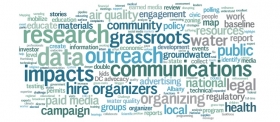Last week HEFN published the results of a new piece of research on the foundations and NGOs addressing impacts of hydraulic fracturing (“fracking”). The report, Fracking Survey 2012, is the result of my work with HEFN and an advisory board to survey a rapidly expanding field of philanthropic and nonprofit organizations working on fracking issues. The 33 foundations and 81 NGOs responding represented many of the organizations most engaged in this field, reporting a total of $17.4 million in fracking-related expenditures by nonprofits in 2012 and $18.3 million in foundation grants.
The work builds on similar research I’ve been involved with to survey foundations and NGOs working on coal, and a new survey of funders focused on the meat and livestock industries. Research of this kind helps funders better understand the work being done across many organizations. It can create opportunities for collaboration and can help improve alignment between funders and their grantees, at a very low cost relative to the amount of resources being channeled into these issues. I strongly believe that as funders we are unlikely to be less effective for having an understanding of the field into which we are making grants. We might actually do better!
The HEFN fracking survey found a quite spontaneously emerging landscape of groups concerned about the impacts of fracking – even in places where there is currently no philanthropic support. NGOs responding were active on fracking in 42 of the 50 states, with the greatest amount of activity in Pennsylvania, New York and Colorado. The NGOs involved told us that they hope to more than double their expenditure on fracking in 2013, compared to 2012. Increased philanthropic support will be important if they are to achieve this objective.
The survey also found that much work on fracking happens at the community level. Given how little infrastructure there currently is for coordination, it was interesting to see a high degree of alignment between NGO and funder responses about their reasons for working on the issue of fracking. Both groups named concerns about impacts on water quality and quantity issues, public health, and environmental conservation as their top three priorities.
When we looked at the approaches that funders and NGOs were using, the survey found less alignment. NGOs reported more of a focus on public awareness and communications, grass-roots organizing and legal activity, while the funders reported greater emphasis on policy and regulatory reform and scientific research. Increased communications capacity is seen as a priority especially within the NGO community, along with more resources for organizing, research, and information-sharing.
This initial snapshot survey suggests a strong base of civic concern in relation to fracking, along with increasing philanthropic engagement. Funders sharing concerns about fracking impacts may be interested in HEFN’s working group on fracking; contact info@hefn.org for more information.
Jon Cracknell is the author of HEFN’s Fracking Survey 2012: Report on NGO and Philanthropic Efforts to Address Impacts of Hydraulic Fracturing. Jon manages the Goldsmith family’s philanthropy and helped to create the U.K. Environmental Funders Network, which brings together 150 trusts and foundations involved in environmental philanthropy.

